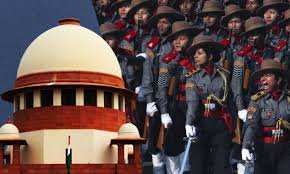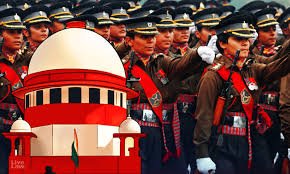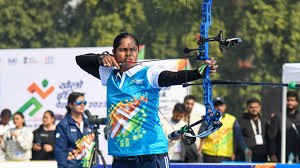SC Grants Permanent Commission to Woman Army Officer
In a landmark ruling, the Supreme Court of India has granted permanent commission (PC) to a woman army officer, Captain Shikha Gupta, in a historic move that paves the way for more women to serve in the Indian Army. This judgment is considered a significant step in addressing gender equality within the armed forces, which had long been a subject of debate and contention.
The Supreme Court’s decision follows a petition filed by Captain Gupta, who sought the permanent commission after being denied the opportunity despite her exceptional service record. The court emphasized the importance of equal opportunities for men and women in the defense forces, reinforcing the need to break the barriers imposed by gender biases in the military.

Why This News Is Important
Breaking Gender Barriers in the Armed Forces
This ruling has tremendous significance as it addresses the long-standing issue of gender disparity in the Indian Army. Women officers have served in various capacities in the Indian Army, but their opportunities for permanent commission were historically limited, which restricted their ability to rise to higher ranks. The Supreme Court’s decision signals a positive shift towards more inclusive policies in the defense services.
Encouragement for Women’s Participation in National Security
With this judgment, women officers in the armed forces now have an equal opportunity to build a career with the same benefits and recognition as their male counterparts. This step not only empowers women in the military but also encourages more women to join the armed forces, contributing to the national security and defense sector.
Setting Precedents for Future Military Reforms
The judgment can serve as a precedent for similar cases and may trigger further reforms in the armed forces regarding the inclusion and empowerment of women. It also calls attention to the importance of progressive thinking in modernizing military recruitment and policies to ensure equality and fairness in all sectors.
Historical Context: Gender Equality in the Indian Army
The inclusion of women in the Indian Army dates back to the early 1990s, when the first batch of women officers was commissioned. However, women officers were initially appointed only in non-combat roles and were granted short-service commissions (SSCs). Despite their impeccable performance and achievements, they faced restrictions on being granted permanent commissions, which limited their career progression.
In 2010, the government of India announced that women officers would be given the opportunity to join the permanent commission in select branches, such as law, education, and medical. However, the process remained slow and filled with several challenges. The Supreme Court’s ruling is a culmination of ongoing legal battles and a reflection of the broader movement toward gender equality in all sectors of society.
Key Takeaways from SC Grants Permanent Commission to Woman Army Officer
| S.No | Key Takeaway |
|---|---|
| 1 | Supreme Court grants permanent commission to Captain Shikha Gupta in the Indian Army. |
| 2 | The ruling sets a precedent for gender equality within the Indian Army and military reforms. |
| 3 | Women officers in the army can now pursue higher ranks and better career opportunities. |
| 4 | The judgment empowers more women to consider a career in the Indian Army, enhancing national security. |
| 5 | The decision highlights the importance of breaking gender barriers in military recruitment and career progression. |
Important FAQs for Students from this News
1. What is the significance of the Supreme Court’s decision to grant permanent commission to a woman army officer?
The Supreme Court’s decision is a groundbreaking step toward gender equality in the Indian Army. It allows women officers to serve with the same benefits, recognition, and career opportunities as male officers, offering them a path to higher ranks and long-term careers in the armed forces.
2. Who is Captain Shikha Gupta, and why is she important in this context?
Captain Shikha Gupta is the woman army officer whose petition led to the Supreme Court ruling granting permanent commission to women officers. Her case was pivotal in challenging the gender biases and limitations that women faced in terms of career advancement within the Indian Army.
3. How will this ruling impact women’s participation in the Indian Army?
This ruling will encourage more women to join the Indian Army, as it offers them a career with equal opportunities for advancement. It signifies a shift toward more inclusive policies, allowing women to reach the same ranks and benefits as men, thus increasing gender diversity within the armed forces.
4. What are the key benefits of permanent commission for women officers in the Indian Army?
Permanent commission provides women officers with a career that is not restricted to a short-term service. They can now hold senior ranks, receive long-term career development, and enjoy retirement benefits. This also enhances their opportunities to contribute to national defense and security in an impactful way.
5. When did women first start being commissioned into the Indian Army, and what roles could they take?
Women officers were first commissioned into the Indian Army in the early 1990s. Initially, they were appointed only in non-combat roles, with limited opportunities for permanent commission. Over time, the scope expanded, but it wasn’t until recent rulings like the Supreme Court’s that women were granted equal opportunities in all military roles.
Some Important Current Affairs Links



















 Exciting News!
Exciting News!  Join Our Telegram Channel Now!
Join Our Telegram Channel Now!
 Join our Telegram channel for a thrilling adventure into the world of daily current affairs.
Join our Telegram channel for a thrilling adventure into the world of daily current affairs. 
 Don’t miss out on the latest updates and insights! Click to join now and be part of the knowledge revolution!
Don’t miss out on the latest updates and insights! Click to join now and be part of the knowledge revolution! 
